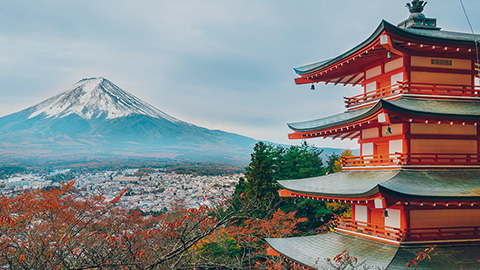International Businesses are Discovering the Appeal of Japan's Regions
April 2024

From Start-ups to Big Businesses, Foreign Firms Are Finding Supportive Homes All Across Japan
At a medical-technology expo in Tokyo in 2022, Taiwanese entrepreneur Hong-Ren Su struck up a conversation with a representative of the University of Tsukuba, the renowned research university in Ibaraki Prefecture, north of Tokyo.
Back home in Taiwan, Su had developed a way to use facial recognition to measure people's vital signs, including blood pressure, blood oxygen levels, and heart rates. Several Taiwanese nursing homes were using the medical school graduate's innovation, which enabled them to monitor residents' health remotely and without invasive methods.
Less than a year later, Su relocated to Japan, where today he is pursuing further research and development with the University of Tsukuba and its affiliated hospital. His goal: to deploy his facial recognition technology in Japan, where the population is aging rapidly and many nursing homes and hospitals are short of staff. Interest in efficient, automated patient-monitoring is high.
Su and his company, SG AITek, are part of a growing wave of international businesses that are building bases in Japan—particularly in regions outside Tokyo. Ranging in size from tiny start-ups to giant global corporations, these enterprises are finding that doing business in Japan's regions is relatively easy, and far cheaper than in the country's "megalopolis" capital.
"Tsukuba is a peaceful place, and it's only 45 minutes by train from Tokyo," says Su of his new home, which may be rural but is home to 29 research and educational institutions, collected under the banner of Tsukuba Science City.

Hong-Ren Su, CEO of SG AITek
Foreign Companies Energize Japan's Regions and Industries
Other Japanese regions are also attracting international attention.
In the semiconductor industry, a resurgence in Japanese production is underway all across the country. Taiwan Semiconductor Manufacturing Company (TSMC) announced in February 2024 that it will build a second production facility in Kumamoto Prefecture, on the southwestern island of Kyushu—adding to another factory that was recently completed, and bringing its total investment in the region to around 20 billion dollars.
Micron Technology of the US is meanwhile planning to invest a further 500 billion yen (around 3.4 billion dollars*) in its operation in Hiroshima, with an eye on the development next-generation DRAM chips. And Rapidus, a Japanese semiconductor company that has partnered with IBM, has plans for a cutting-edge foundry in northern Hokkaido Prefecture.
Outside microchips, IT heavyweights including Google, Amazon, and Microsoft, have announced plans for new data centers in relatively rural areas of Kanto and Kansai, the regions centered on Tokyo and Osaka. And in pharmaceuticals, America's Eli Lilly and Company, which has its Japan headquarters in the western city of Kobe, is adding staff as it introduces new treatments for Alzheimer's and other diseases.
The Hidden Potential of Japan's Regional Areas
Experts cite several reasons for the attractiveness of Japan's regions.
Some parts of the country are major economies in their own right: Kansai, which is home to the cities of Osaka and Kyoto, would rank among the top 20 national economies if it were an independent state. This shows that there is sufficient business opportunity in Japan's regions outside of the capital for foreign companies to enter.
Japan's extensive and efficient high-speed rail system means that even rural regions are conveniently connected to major markets. And several regions—notably in the southwest—are close to the fast-growing Asian mainland, which are connected directly to Japan via the country's many regional ports and airports.
These advantages are supplemented by a world-class higher education system, with universities in every prefecture ensuring that the Japanese workforce is well equipped and relatively evenly distributed. Many universities are actively nurturing start-ups and link with local and international businesses. According to the Ministry of Economy, Trade and Industry, the number of start-ups originating in Japanese universities more than doubled between 2016 and 2022, to 3,782.
Then there is the cost savings. A sharp drop in the yen's exchange rate since 2021 made Japan as a whole a more affordable place to visit, invest and do business than it had been in decades. And in places outside Tokyo, money stretches even further: a typical household in Akita, in the northern Tohoku region, spends 23 percent less every month than households in central Tokyo do. Rent in Akita is less than half what it is in the capital.
Local governments are also adding to the appeal with services and subsidies for foreign businesses. In addition to disseminating information and conducting PR for overseas markets, the Ibaraki prefectural government offers up to 2 million yen each for subsidies on joint research trial of international companies that partner with local universities or businesses, project facility establishment, and research and development expenses, and up to 2.4 million yen of covered rental expenses for 12 months—a package worth as much as 8.4 million yen in total.
"Land is already cheaper here than in Tokyo, and the assistance makes it that much easier for companies to relocate here," says Mizuki Sawasa of Ibaraki's International Business Development Division.
Since the subsidy program was introduced in 2018, 10 international companies have qualified and moved to the prefecture, representing fields including life sciences, information technology, and space exploration.

Tsukuba City in Ibaraki Prefecture
Open to Innovation
Hong-Ren Su of SG AITek says that in addition to financial support, Ibaraki provided advice on how to register his company and navigate administrative hurdles. He also received help from the Japan External Trade Organization (JETRO), which gave him temporary office space and introduced him to business contacts.
"Ibaraki, JETRO, and the university have been extremely helpful," he says. "They say Japan is a conservative market, but when it comes to new technology, I've found it quite open."
(*1 dollars = 146.76 yen, March 12, 2024)
Learn More
Contact Us
Investing in Japan
We will do our very best to support your business expansion into and within Japan. Please feel free to contact us via the form below for any inquiries.
Inquiry FormJETRO Worldwide
Our network covers over 50 countries worldwide. You can contact us at one of our local offices near you for consultation.
Worldwide Offices

























